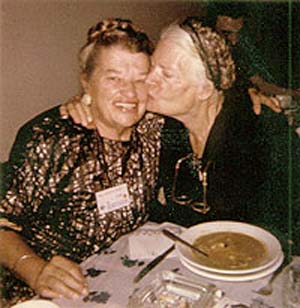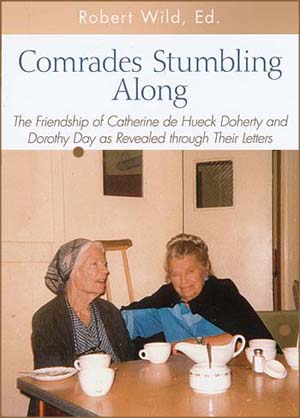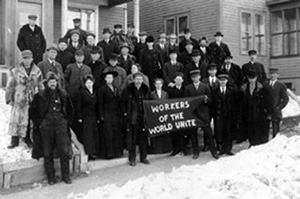 |
Ecumenism
The Spirit of Madonna House - Part III
Catherine Doherty’s Sympathy
for Socialism
Dr. Carol Byrne
A vital, contemporary clue as to the radical nature of Catherine Doherty’s agenda was provided by the veteran Socialist agitator, Dorothy Day, who noted with approval a distinct similarity with her own work. With reference to Friendship House, the forerunner of Madonna House, she stated in 1935:
“Friendship House, where we visited in Toronto, is a place much like our own offices here in New York…The group which is running the place under the direction of Catherine de Hueck [Doherty] is engaged in propaganda activities among the children and workers in one of the poorest districts of Toronto. … This very active group of workers has been distributing 2,000 copies of The Catholic Worker every month, but now the order has been increased to 4,000.” (1)

The enduring friendship of Dorothy Day and Doherty, above, in Rome in 1957 |
As Stanley Vishnewski, a contemporary follower of Dorothy Day, put it, “In those early days, Friendship House and the Catholic Worker were considered by many to be sister movements.” (2) Catherine Doherty freely acknowledged her debt to the founders of the Catholic Worker:
“I thought how much we of Friendship House owed to Peter [Maurin] and to Dorothy Day and their family of the Catholic Worker. I doubt if I would have persevered in the apostolate if it were not for the help of these two.” (3)
These facts speak of a clear identity between Dorothy Day and Catherine Doherty.
Toronto Friendship House was closed on December 28, 1936 by the Archdiocese following the recommendations of a committee of five priests appointed by Archbishop McGuigan to investigate its work among immigrants. Catherine Doherty’s supporters refuse to consider that the decision to close Friendship House and dismiss her from her position had anything to do with suspect social activities among immigrants.
But Doherty herself provided a clue when she complained to Dorothy Day: “I’ve been accused of being a Communist. I don’t know how long I will be able to continue the work.” (4) But there were grounds for the suspicions against her. The evidence presented below suggests that Catherine, like her counterpart, Dorothy Day, was an undercover agent for the infiltration of Socialism into the Church.

The letters of Day and Doherty reveal similar aims |
It is entirely reasonable that one should suspect Doherty of Communist sympathies as her analysis of social conditions was in line with those of Karl Marx. She stated that the poor were being exploited and made to live in degrading conditions while the workers were driven to sweatshop labor through the “greed and selfishness” of the rich. (5) She threatened that defending Capitalism would lead to a violent revolution in which “the workers will be lost and our churches will light the evening sky with their flames.” (6)
This attitude is displayed forcefully in the Social Forum, a newspaper that modelled itself on the Catholic Worker and was distributed by Friendship House in Toronto with the help of Fr. Cullinane. (7) It stated:
“It is so easy to blame those terrible Communists for all the ills that Spain is heir to and to hope that good General Franco may drive them and their fanatical atheism into the middle of the Mediterranean Sea.
“When we look at the facts, however, we become hesitant to give the Fascist rebels the Crusader’s Cross. The revolt was engineered by a military clique who was being shorn of its power and privilege. It was financed by the wealthy landowners and industrialists who saw their economic dictatorship threatened... And this combination of caste and wealth, in their determination to secure by arms what they could not defend by ballots, did not hesitate to plunge the whole country into a civil war.” (8)
Catholicism in Spain was denigrated and the Church accused of having “for 40 years turned a deaf ear to Christ”:
Preferring the security of a State religion under the old regime Spanish Catholics winked at social abuses, abuses that could not be attacked without incurring disfavour of the government and the class that kept it in power. As a result, the Church in Spain has become identified with reaction, and the worker has turned for leadership to the bitterest enemies of the faith. (9)
Doherty rebuked Catholics who condemned Communism, accusing them of causing the conditions that gave rise to it: “Communists are not born. They are made: they are the product of hypocritical Christians who render to Christ lip service.” (10)
And she accused Catholics – clergy and laity – of being apathetic in areas of social justice, adding that the Communists put Catholics to shame in their responsiveness to human suffering.

Doherty encouraged worker strikes and joined picket lines |
The suspicion that Doherty had sympathy for the Communist cause is further strengthened by the fact that in October 1931, with the support of Archbishop McNeil who had a progressivist understanding of Catholic social teaching, she spent a year infiltrating Communist organizations and compiling a survey on their activities. Immediately afterwards, she followed their policies and adopted the same tradition of revolutionary activism, with the result that her settlement house in Toronto became a radical milieu for propaganda among the immigrant population.
She became involved in strike action and joined picket lines, on one occasion against a company that was a major beneficiary to the Diocese, for which she earned a reprimand from the Archbishop. (11) She established libraries, study clubs, youth organizations, children’s activities and meetings to win influence for Socialist opinions regarding the political, social and economic order.
Conclusion
Starting from the early ecumenical and “social justice” work of Archbishop McNeil, through the work of Friendship House and after Madonna House, we can see how the seeds of Socialism were planted in the Canadian Church in the first half of the 20th century.
Few Canadians then could have foretold that in the next generation one of their Bishops, expanding on McNeil’s original groundwork, would place the Church on the road to Liberation Theology. Yet that is what happened during the term of Bishop Remi de Roo (1962-1999), who described himself as a “Pilgrim of Vatican II.” As Chairman of the Canadian Bishops’ Social Affairs Commission, he pursued a radical progressivist “social justice” agenda.
Significantly, none of this could have come about without the work of radical activists to change the perceptions of Catholics and silence opposition to Communism.
1. Dorothy Day, Catholic Worker, March 1935
2. Robert Wild, Restoration, (the Newsletter of Madonna House), 1 May 2008
3. Catherine de Hueck Doherty, Not Without Parables: Stories of Yesterday, Today and Eternity, , Notre Dame, Indiana, Ave Maria Press, 1977, p. 58
4. Robert Wild, ‘Dorothy Day and Catherine Doherty: Comrades Stumbling Along’, Restoration, 1 May 2008.
5. Catherine de Hueck, ‘The Evils of Communism,’ Clippings 1930-37, MH files, quoted in Elizabeth Louise Sharum, A Strange Fire Burning: A History of the Friendship House Movement, Texas Tech University, PhD thesis, p. 50
6. Ibid., p. 50
7. Bernard Daly, op. cit., p. 12
8. Social Forum, August 1936, quoted in Art Cawley, ‘The Canadian Catholic English-Language Press and the Spanish Civil War’, Canadian Catholic Historical Association, Study Sessions, Vol. 49, 1982
9. Ibid.
10. Elizabeth Louise Sharum, op. cit., pp. 40-41
11. James Buckley (ed.), Frederick Christian Bauerschmidt, Trent Pomplun, The Blackwell Companion to Catholicism, Blackwell Publishing, 2005, p. 200

Posted April 2, 2012
Ecumenism | Hot Topics | Home | Books | CDs | Search | Contact Us | Donate
 © 2002-
Tradition in Action, Inc. All Rights Reserved
© 2002-
Tradition in Action, Inc. All Rights Reserved
|
 |
|

|